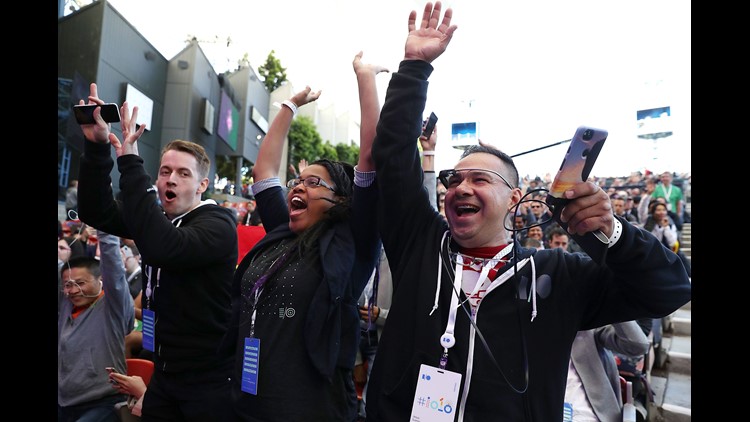Google has its robot work cut out for it.
Janell Goplen automatically hangs up the phone when she receives automated calls to her Clearwater restaurant in Newport, Oregon.
In the summer, Google will begin testing its controversial new plan to have the Google Assistant smartphone app make human-sounding calls for restaurant reservations and hair-cut appointments. If Goplen were to get the call and she sensed that it was robotic, "I'd hang up," she says. "Google would have to let me know this was a Google reservation."
In a demo this week, the technology called Duplex wowed the crowd at Google's annual I/O conference with recordings of actual conversations between a bot and the person taking the reservation. The Google Assistant making the calls sounded eerily human, complete with "umms" and "ands" and appropriate follow-ups.
But what Google didn't do in the demo is to tell person on the other end that he or she was speaking to a robot. And when pressed for clarification Wednesday about whether it would do so in the tests, Google declined to answer, sending USA TODAY to the corporate blog, where it said "transparency," was important to the company. The blog didn't specify how Google would inform people that a robot was making the calls.
Google's demo is one of the most innovative, forward-looking consumer tech innovations of the year. It promises to save people the hassle of picking up the phone and going through the steps of asking for a time to come in. Instead, just click a button, specify the time, and await the followup e-mail or text.
But in the aftermath of the demo, many questions arose that Google was not willing to answer. Consumers bitterly complain about robocalls, which are rising despite regulatory vows to stop them. Doesn't Duplex promise to usher in even more of them, albeit ones that can work for you? And is Google's technology strong enough to really handle the transaction? What if the robot is put on hold or asked to press #5 for reservations?

Attendees cheer before the start of the Google I/O 2018 Conference.
JUSTIN SULLIVAN, Getty Images
"When people call us, we ask them where they want to sit, inside, outside or upstairs," says Goplen. "We ask if they mind climbing the stairs. We ask if it's a special occasion, if they know where our parking lot is."
Jordan Belt, who works at Ziggy's Hair L.A., a Los Angeles area hair salon, says callers to her establishment are asked a lot of questions too, about hair color and style of cut wanted. "Could the computer handle the questions?" she asks.
Google says Duplex "is capable of carrying out sophisticated conversations and it completes the majority of its tasks fully autonomously, without human involvement." But when faced with a difficult conversation that the bot can't handle, Google says it will then default to a human operator.
Lauren Weinstein, a Los Angeles-based technology consultant, says the system can work if Google is upfront about it. "Humans in general don't mind talking to machines so long as they know that they're doing so," Weinstein says. "I anticipate significant negative reactions by many persons who ultimately discover that they've been essentially conned into thinking they're talking to a human, when they actually were not."
With so many of us cursing at our phones daily for all those annoying robo calls, Alex Quilici, the CEO of the app YouMail, which promises to cut down on robocalls, calls Google's technology "a massive Christmas present to robocallers."
Everywhere there is technology for good, there's technology for bad, he notes, and if Google could figure out how to do it, so could rogues. "Who needs a call center anymore, if you can use technology to call millions of people at a low cost, without human involvement," he asks.
Google pushes back that robocalls are used to sell a product and rely on callers picking up the phone and agreeing to buy something, as opposed to bots doing something on behalf of the consumer, say making reservations and checking holiday hours.
Still, Weinstein worries about the technology getting into the wrong hands, and being used to make "hundreds" of fake appointments, just to mess with the business, call law enforcement with "false police reports," and the like.
Google says Duplex will be tested only in the United States, in a handful of locations, but wouldn't specific where they would be. Due to state laws regarding recorded conversations, Bret Kinsella, the publisher of the Voicebot.ai website, expects Google to be restricted from testing it in 12 states,
California, Connecticut, Delaware, Florida, Illinois, Maryland, Massachusetts, Montana, Nevada, New Hampshire, Pennsylvania, and Washington State all have "all party" consent laws that restrict the recording of phone conversations and require permission to be granted first, he notes.
But Kinsella expects even if businesses are initially opposed to Duplex, they'll come around. "If they start to lose business because they're not accepting Google reservations, it would be in their interest to start taking them."
Madeleine Eller is ready. As a consumer, "I want to talk on the phone as little as possible. I don't want to be put on hold, or go over the details of the order. I just want to click a button," she says.
She also runs Tulsa, Oklahoma area restaurants. So even though she thinks the idea of robot reservations is "weird," she understands. "It will probably bring in more business," she says.
Follow USA TODAY's Jefferson Graham on Twitter,YouTube and Instagram, listen to the daily Talking Tech podcast on Apple Podcasts and Stitcher and read the weekly Talking Tech newsletter.
Copyright 2017 USATODAY.com
https://www.11alive.com/article/news/nation-now/googles-version-of-robocalls-has-small-businesses-skeptical/465-55ad4d57-fe32-4a5f-b687-7c77c8bc6d6cBagikan Berita Ini
















0 Response to "Google's version of robocalls has small businesses skeptical"
Post a Comment